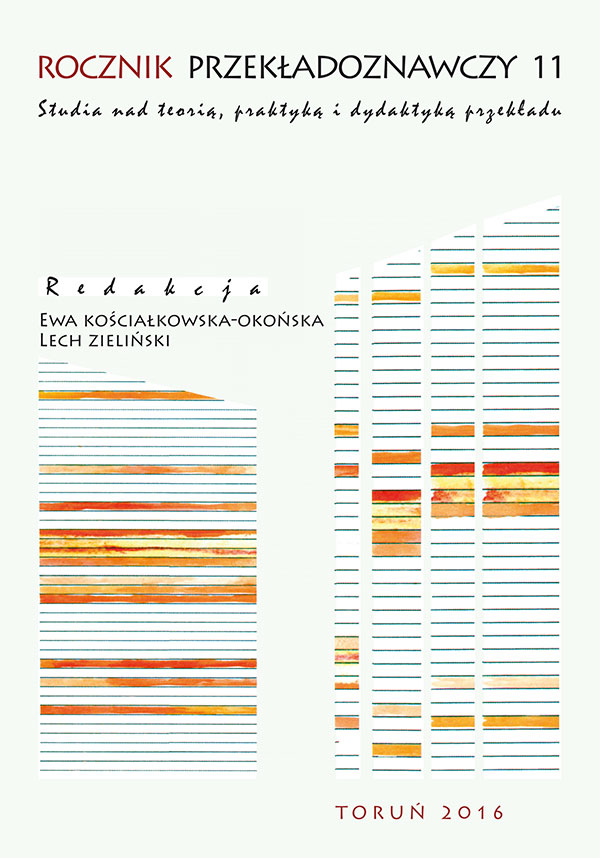Biblical stylization of Polish and English translations of Friedrich Nietzsche’s Zarathustra as exemplified by references to the Decalogue
DOI:
https://doi.org/10.12775/RP.2016.005Keywords
Nietzsche, Bible, translationAbstract
Friedrich Nietzsche is considered one of the most brilliant thinkers in the history of philosophy. His works and ideas have provided inspiration for humanists with a wide spectrum of interests. In his masterpiece Also sprach Zarathustra Nietzsche mimics the style of the Luther Bible. The book contains numerous examples of biblical quotations, allusions and lexemes. The author of this article tries to illustrate the way translators expressed the references to the Decalogue in their languages. The article is also an attempt to examine to what extent translation errors and inaccuracies in this field can cause a misunderstanding of the messages conveyed by the philosopher who intended to criticize Christian morality by using biblical language. The corpus includes four Polish and seven English translations of Zarathustra, confronted with primarily classical versions of the Holy Scriptures, namely the Jakub Wujek Bible and the King James Bible. The comparison leads to a conclusion that the English translations of the aforementioned references approximate more to the German original than the Polish versions.
References
Bennholdt-Thomsen, A., 1974, Nietzsches Also sprach Zarathustra als literarisches Phänomen. Eine Revision, Frankfurt a. M.
Bieńkowska, D., 2002, Polski styl biblijny, Łódź.
Cieszkowski, M., 2004, „Tako rzecze Zaratustra czy Tak rzekł Zaratustra – uwag kilka o polskich tłumaczeniach niepokornego tekstu”, [w:] Recepcja, transfer, przekład, t. 2, J. Koźbiał (red.), Warszawa, s. 109–120.
Duden, 2002, Zitate und Aussprüche, Duden, t. 12, Mannheim.
Dybel, P., 2007, „Płomień Nietzschego. Wywiad z Krzysztofem Michalskim”, [w:] Nowe książki, nr 5, Warszawa, s. 4–8.
Figal, G., 2001, Nietzsche. Eine philosophische Einführung, Stuttgart.
Gómez, T., 2007, Fryderyk Nietzsche. Człowiek i twórca, przeł. G. Ostrowski, Warszawa.
Hollingdale, R.J., 1999, Nietzsche, przeł. W. Jeżewski, Warszawa.
Jens, W., 1976, Republikanische Reden, München.
Kaulhausen, M.H., 1977, Nietzsches Sprachstil. Gedeutet aus seinem Lebensgefühl und Weltverhältnis, München–Wien.
Köhler, J., 2000, Wer war Friedrich Nietzsche? Kurzer Versuch, eine Jahrhundertfrage zu beantworten, Bonn.
Lipiński, K., 2002, „O starzeniu się przekładu literackiego”, [w:] Język trzeciego tysiąclecia II, t. 2: Polszczyzna a języki obce: przekład i dydaktyka, W. Chłopicki (red.), Język a komunikacja, t. 4, Kraków, s. 171–181.
Nietzsche, F., 1999, Nachlaß 1884–1885, G. Colli, M. Montinari (red.), Kritische Studienausgabe, t. 11, München.
Plęs, Ł.M., 2010, „Die Übersetzung als bahnbrechendes Meisterstück der Nationalliteratur (dargestellt an klassischen Bibelfassungen im Deutschen, Polnischen und Englischen)”, [w:] Die deutsche Sprache im Spiegel vielfältiger wissenschaftlicher Untersuchungen, Z. Weigt (red.), Łódź, s. 111–119.
Plęs, Ł.M., 2012, „Friedrich Nietzsche – Dichter oder Denker?”, [w:] Wechselbeziehungen zwischen Sprache, Literatur und Kultur, W. Sadziński, M. Gołaszewski (red.), Acta Universitas Lodziensis. Folia Germanica, t. 8, Łódź, s. 35–49.
Prossliner, J., 2002, Nietzsches Zarathustra, München. Rajewicz, T., 2002, „Dzieło i przekład w czasie. O języku polskich przekładów dzieła Fryderyka Nietzschego Also sprach Zarathustra”, [w:] Recepcja, transfer, przekład, t. 1, J. Koźbiał (red.), Warszawa, s. 127–140.
Rajewicz, T., 2003, „Nietzsches Philosophie in polnischen Übersetzungen. Am Beispiel von Zarathustras Rede Von den drei Verwandlungen”, [w:] Probleme der literarischen Übersetzung, M. Krysztofiak-Kaszyńska (red.), Studia Germanica Posnaniensia, t. XXIX, Poznań, s. 143–151.
Safranski, R., 2003, Nietzsche. Biografia myśli, przeł. D. Stroińska, Warszawa.
Vitens, S., 1951, Die Sprachkunst Friedrich Nietzsches in „Also sprach Zarathustra”, Bremen.
Downloads
Published
Issue
Section
License
Copyright (c) 2016 Translation Journal

This work is licensed under a Creative Commons Attribution-NoDerivatives 4.0 International License.
Stats
Number of views and downloads: 971
Number of citations: 0



